Study shows Americans view Chinese brands positively
Updated: 2012-06-15 10:49
By Ariel Tung in New York (China Daily)
|
||||||||
"Made in China" is a phrase Americans know mainly as an indicator of pervasive offshore manufacturing. But increasingly it's being attached to products originating in China from domestic companies - and gaining acceptance in the West.
A recent survey by Li-Ning, a leading Chinese athletic footwear and apparel company, found that a growing number of US consumers are willing to buy Chineseorigin products.
Li-Ning Co, which was founded by 1984 Olympic gold medal-winning gymnast Li Ning, set out in 2011 to launch a sportswear line in the United States. The Beijing-based company partnered with Acquity Group, an e-commerce and marketing consultant, to help expand its US consumer base.
They came up with Digital Li-Ning, a joint venture with a $10 million investment that entailed the launch of an online retail site, www.Li-Ning.com, and development of a new apparel collection for the US market. Digital Li-Ning is based in Chicago.
According to the study, there has been a significant shift in US consumers' perception of Chinese brands over the past five years. About 62 percent of Americans said they're more likely to purchase products from Chinese companies today than they were in 2007.
Two consumer groups, "Millennials" from 18 to 25 years old and those with annual household income of over $225,000, were most likely to regard Chinese brands favorably.
"The openness among Millennials and upper-income levels is a key part of our strategy, as it provides an opportunity for us to tap into these markets and tailor our products to fit their needs," said Craig Heisner, Li-Ning's vice-president of sales, marketing and merchandising.

More than half of the survey respondents, according to Li-Ning, said they believe the quality of Chinese brands will measure up to US-branded goods in the next five years.
Electronics had the highest favorability rating among categories of Chinese products, with appliance manufacturer Haier and PC maker Lenovo the best-known companies.
Li-Ning was particularly encouraged by Millennials' positive perception toward Chinese brands. It is "a positive indicator that our brand strategy is right on target," Heisner said.
"As digital natives, we know they are more open to our digital-only approach and prefer to interact with companies via digital channels," he said. "The same opportunity lies with the more-affluent market, as the survey results indicate they are more familiar with Chinese culture and products, making them more open to what Li-Ning has to offer."
Shaynah Kowitz, 28, said her assessment of a product is based on its quality, not where it was made.
"One Chinese brand may be of good quality, another Chinese brand may not be," she told China Daily. "I don't judge a brand from its country. I think Chinese brands will, over time, gain recognition in the US. Most products we have are made in China anyway."
Dana Sease, 25, said she visited China with her family about two years ago, and they were happy with the Chinese products they bought there.
"I think Chinese products will gain more recognition over time The Chinese economy is doing very well," she said.
Ann Lee, a China expert based in New York, said she wasn't surprised by the results of the Li-Ning study.
"The perception that products made by Chinese companies are of poor quality is not just limited to Americans - Europeans think that way too. They worry about counterfeit products," said Lee, who is a senior fellow at Demos, a left-leaning think tank, instructor at New York University and author of the recent book What the US Can Learn From China.
"The older generation has that notion, and it's harder to change their mind. Younger people who don't have that mindset are more receptive toward Chinese products," she said.
"Over time, Americans should be more open as Chinese products continue to improve."
Still, China lacks a "Top 100" global brand, said Crocker Coulson, president of CCG Investor Relations, which advises many Chinese companies.
"China remains a 'hidden dragon' in that respect," he said. "Brands can only be earned over time. You've got to build relationships with the media, financial markets and government. All these have to be synchronized in delivering the message."
Chinese companies are trying to learn from Western giants such as Procter & Gamble Co about brand-building, according to Eric Schmidt, founder and president of China Entrepreneurs, a Beijing consulting firm.
"People think of China as a manufacturing base. They don't understand the quality of Chinese products and brands. Over the next 10 years, things will change because Chinese companies learn so fast. They will be able to absorb those marketing skills," said Schmidt.
atung@chinadailyusa.com

 Relief reaches isolated village
Relief reaches isolated village
 Rainfall poses new threats to quake-hit region
Rainfall poses new threats to quake-hit region
 Funerals begin for Boston bombing victims
Funerals begin for Boston bombing victims
 Quake takeaway from China's Air Force
Quake takeaway from China's Air Force
 Obama celebrates young inventors at science fair
Obama celebrates young inventors at science fair
 Earth Day marked around the world
Earth Day marked around the world
 Volunteer team helping students find sense of normalcy
Volunteer team helping students find sense of normalcy
 Ethnic groups quick to join rescue efforts
Ethnic groups quick to join rescue efforts
Most Viewed
Editor's Picks

|

|

|

|

|

|
Today's Top News
Health new priority for quake zone
Xi meets US top military officer
Japan's boats driven out of Diaoyu
China mulls online shopping legislation
Bird flu death toll rises to 22
Putin appoints new ambassador to China
Japanese ships blocked from Diaoyu Islands
Inspired by Guan, more Chinese pick up golf
US Weekly

|

|






